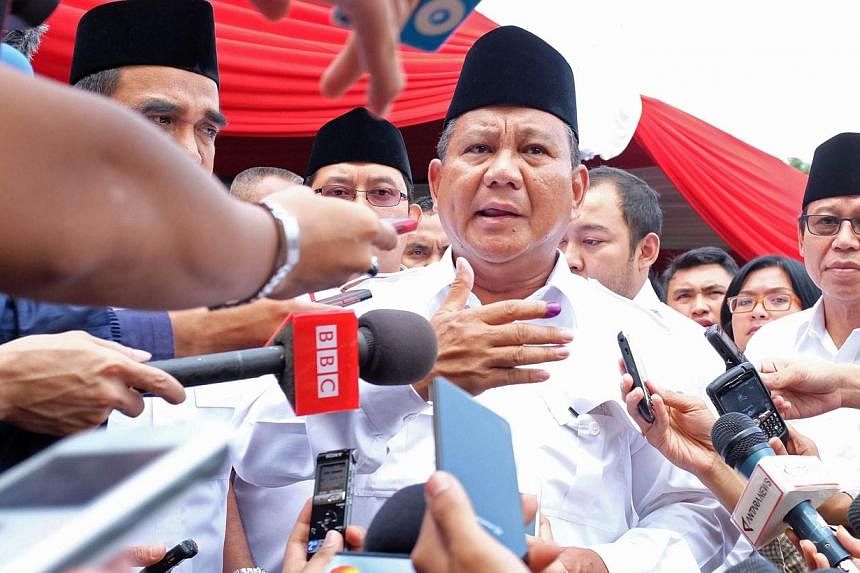Just recently I received an e-mail rocket from a good friend of mine, a non-journalist, criticising a column I wrote which he thought I had unfairly favoured the hugely controversial presidential candidate Prabowo Subianto (The Prabowo Subianto I know).
I was a little surprised, frankly, because I had consciously strived to bring some balance to the piece. But I suppose I shouldn't have been. Indonesia has never been as polarised as it has been during the past few weeks of campaigning.
In these days of bloggers and twitterers, whose opinions are either based on rumour or on reporting in the mainstream media, it is becoming increasingly difficult for a professional journalist to take an objective view.
I recently went to a panel discussion at the Jakarta Foreign Correspondents Club where one of the speakers, a senior and much-respected Indonesian editor, spoke about the importance of separating our private thoughts from our work as journalists.
Then he went on to describe Mr Prabowo as a new Adolf Hitler, apologising at the same time to an upset woman from the candidate's Great Indonesia Movement Party (Gerindra) for baring his personal prejudices at a public forum.
I have never believed a newspaper should endorse a political candidate, so I wasn't that happy at seeing the The Jakarta Post declare for Joko Widodo, the former Jakarta governor who, according to a range of quick-counts, is going to win the presidency.
I know it is a common practice, particularly in the United States. But how many people can separate editorial page comment from the way a newspaper approaches its political reporting? Good luck with that in conspiratorial Indonesia.
It is difficult, of course, for journalists to keep their private thoughts hidden. At some point or another in a column or story, either through undue emphasis or an overly emotive word, we can let slip an inner agenda.
But from the day I first entered a newsroom in 1962 I was taught to cover both sides of a story. I see no reason why I should deviate from that now, even if I do realise that columnists have more latitude to express their own beliefs.
Obviously I do sometimes, especially where the issue is black and white. But this is a presidential election and I think we should at least have respected the opinions of those voters who chose Mr Prabowo because they wanted the strong leadership he promised after a decade of wishy-washy governance.
I have very mixed feelings about him myself, and I have certainly heard all the expressions of foreboding about what would happen if he was declared the winner. But as informed as it might be, speculation should not be allowed to colour all of what we write.
No matter what they perceive to be the stakes, those who champion democratic rights should not then turn around and criticise if a significant body of constituents, for their own very different reasons, choose someone they don't like.
We've seen a lot of that in Thailand, where the Bangkok elite wants to disenfranchise rural voters in the north and northeast for supporting deposed prime minister Thaksin Shinawatra, a figure even more divisive than Mr Prabowo.
The Jakarta Post took the same moral high ground five days out from the July 9 election, declaring in an editorial that there is "no such thing as being neutral when the stakes are so high." High-minded stuff indeed.
"At certain junctures in a nation's life, its people are called on make stark choices," it went on. "No longer is it a mere ballot cast for one candidate over another, but rather a moral choice on the fate of a nation."
As much as Mr Joko's supporters liked to portray the race as good vs evil, this was not a classroom election. It was the big leagues, a contest for political control over the world's fourth largest nation.
Indonesia's last two direct presidential elections have been polite affairs, as befitting the dominant Javanese culture. But with only two candidates in the race this time, it shouldn't have been any surprise that the heavy-spending Prabowo camp would play for keeps.
As long as it stays within bounds, a polarised constituency is not such a bad thing. It shows people are getting personally engaged in the democratic process, rather than standing on the sidelines and leaving it to the political elite.
My wife's driver is a died-in-the-cotton fan of Mr Joko, the candidate that most credible organisations conducting quick counts have named the winner as of July 10. The driver wore Mr Joko's trademark red-and-blue checked shirt to work and was even an active volunteer in his campaign, one of the encouraging new developments in this election season.
Like many Indonesians today, he made up his own mind about who to support. He is a quiet man by nature, but I hope now that he remains engaged and understands that his duty as a citizen does not end at the polling station.
Did the better man win? Only time will tell. But I think we can all honestly say that under a Joko presidency, Indonesia can hopefully look forward to a truly new beginning. Hey, everyone likes a winner - even me.

